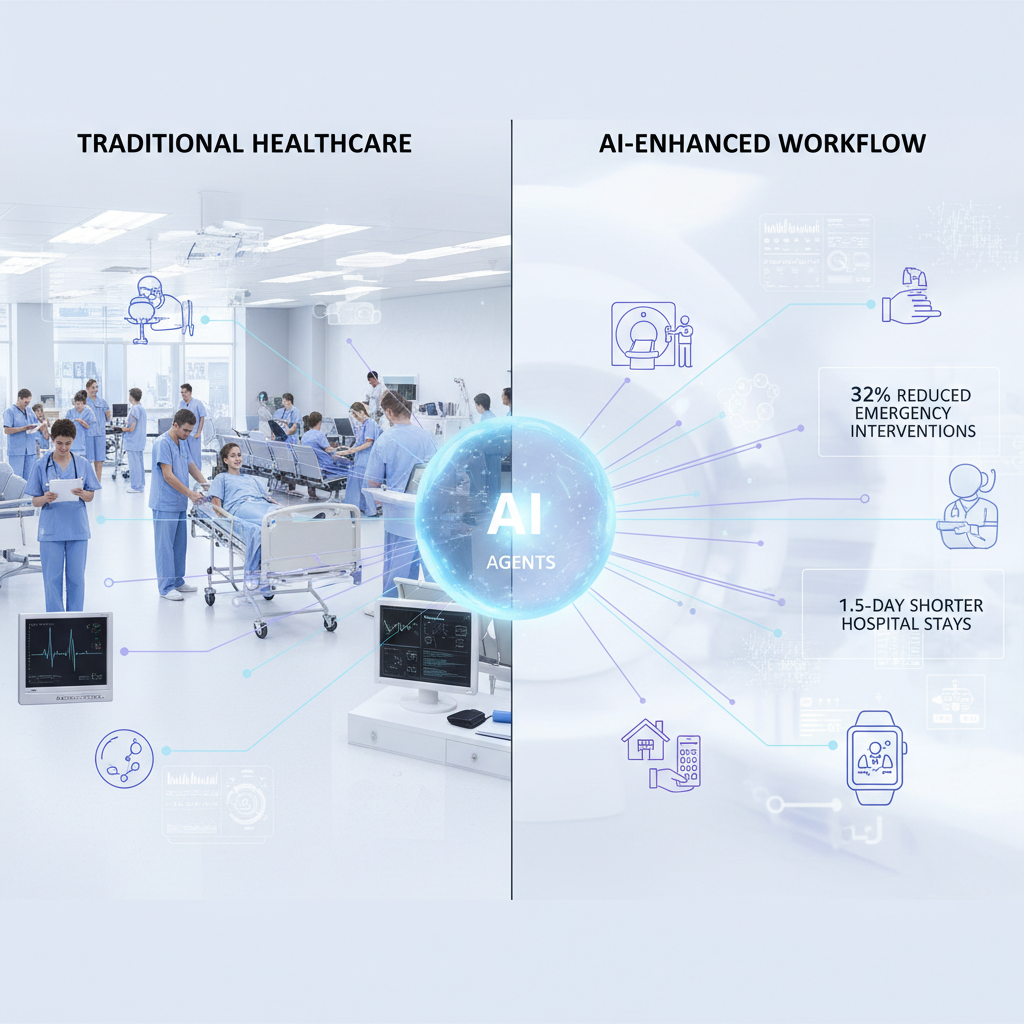
Frameworks, core principles and top case studies for SaaS pricing, learnt and refined over 28+ years of SaaS-monetization experience.
Thank you! Your submission has been received!
Oops! Something went wrong while submitting the form.
Join companies like Zoom, DocuSign, and Twilio using our systematic pricing approach to increase revenue by 12-40% year-over-year.

In the rapidly evolving healthcare landscape, agentic AI—artificial intelligence systems that can operate independently to achieve specific goals—is emerging as a transformative force. These advanced medical intelligence systems aren't just passive tools; they actively participate in healthcare delivery, from diagnosis to treatment planning and beyond. As healthcare providers face mounting pressures from staff shortages, increasing patient loads, and rising operational costs, agentic AI offers promising solutions that could redefine medical care as we know it.
Traditional healthcare AI typically performs isolated tasks based on predefined rules. In contrast, agentic AI systems function with greater autonomy, connecting multiple systems while making decisions aligned with specific healthcare objectives. This represents a significant evolution in healthcare automation, allowing for more comprehensive and adaptive medical intelligence solutions.
According to a recent McKinsey report, healthcare AI applications could create up to $350 billion in annual value, with agentic systems playing an increasingly significant role in this transformation. These systems are characterized by their ability to:
Agentic AI is revolutionizing diagnostic processes through systems that can analyze patient data, medical images, and clinical notes simultaneously. For example, Mayo Clinic's collaboration with Google Health has developed an agentic system that not only detects abnormalities in medical images but also autonomously retrieves relevant patient history, suggests potential diagnoses, and recommends further tests—all while explaining its reasoning to physicians.
These systems don't merely flag potential issues; they actively participate in the diagnostic workflow, prioritizing cases based on urgency and ensuring that critical conditions receive immediate attention.
In treatment planning, agentic medical intelligence shines through its ability to personalize care approaches. The University of California San Francisco Medical Center has implemented an agentic system that:
This represents a significant advance over standard clinical decision support tools, as the system actively participates in the ongoing treatment process rather than simply providing information at a single point in time.
Perhaps the most exciting clinical application of agentic AI is in continuous patient monitoring and proactive intervention. Healthcare automation has reached new levels with systems that:
Providence Health's "Virtual Hospital" program uses such systems to monitor thousands of patients across multiple facilities, with agentic AI managing routine cases while escalating complex situations to human specialists. This approach has reportedly reduced emergency interventions by 32% and shortened hospital stays by an average of 1.5 days.
Despite its potential, implementing agentic AI in healthcare faces significant hurdles. A 2023 survey by the American Medical Informatics Association found that 68% of healthcare organizations cite integration with existing systems as their greatest challenge in adopting advanced medical intelligence solutions.
Other key concerns include:
Agentic systems require diverse, high-quality data to function effectively. However, healthcare data often remains siloed across different systems and providers. Successful implementation depends on creating standardized data formats and secure sharing protocols that protect patient privacy while enabling AI systems to access comprehensive information.
Medical intelligence systems must demonstrate safety and efficacy before widespread adoption. The FDA has recently created a specialized pathway for evaluating agentic AI in healthcare, focusing on continuous monitoring of performance after deployment. This "adaptive regulation" approach aims to balance innovation with patient safety.
For healthcare AI to succeed, it must seamlessly integrate into clinical workflows rather than adding complexity. According to Dr. Robert Wachter, Chair of the Department of Medicine at UCSF, "The most successful medical AI systems will be those that clinicians barely notice because they fit so naturally into the way healthcare is delivered."
Looking ahead, the evolution of agentic AI in healthcare will likely follow several key trajectories:
Future systems will combine inputs from diverse sources—imaging, lab results, genomic data, wearable sensors, and patient-reported outcomes—to create comprehensive health assessments that no single data type could provide. This holistic approach promises more accurate diagnoses and personalized treatment plans.
Rather than replacing medical professionals, the most effective agentic systems will enhance human capabilities through collaborative intelligence. These systems will handle routine tasks and data analysis while human experts focus on complex decision-making, empathetic patient care, and unusual cases that require creative problem-solving.
As medical intelligence systems become more sophisticated, healthcare may increasingly move beyond traditional facilities. Agentic AI could enable continuous monitoring and intervention in patients' homes, workplaces, and communities, making healthcare more accessible while reducing costs.
The integration of agentic AI into healthcare represents a profound shift in how medical services are conceived and delivered. These medical intelligence systems promise greater efficiency, accuracy, and personalization in patient care. However, their successful implementation will require thoughtful navigation of technical, regulatory, and cultural challenges.
As Dr. Eric Topol, founder of the Scripps Research Translational Institute, notes, "The goal isn't to replace doctors with algorithms, but to free clinicians from routine tasks so they can focus on the human dimensions of care that machines cannot replicate."
For healthcare executives and technology leaders, the message is clear: agentic AI isn't just another technological tool but a transformative force that will reshape healthcare delivery models. Organizations that strategically implement these systems while maintaining focus on the human elements of care will be best positioned to thrive in this new era of medical intelligence.

Join companies like Zoom, DocuSign, and Twilio using our systematic pricing approach to increase revenue by 12-40% year-over-year.